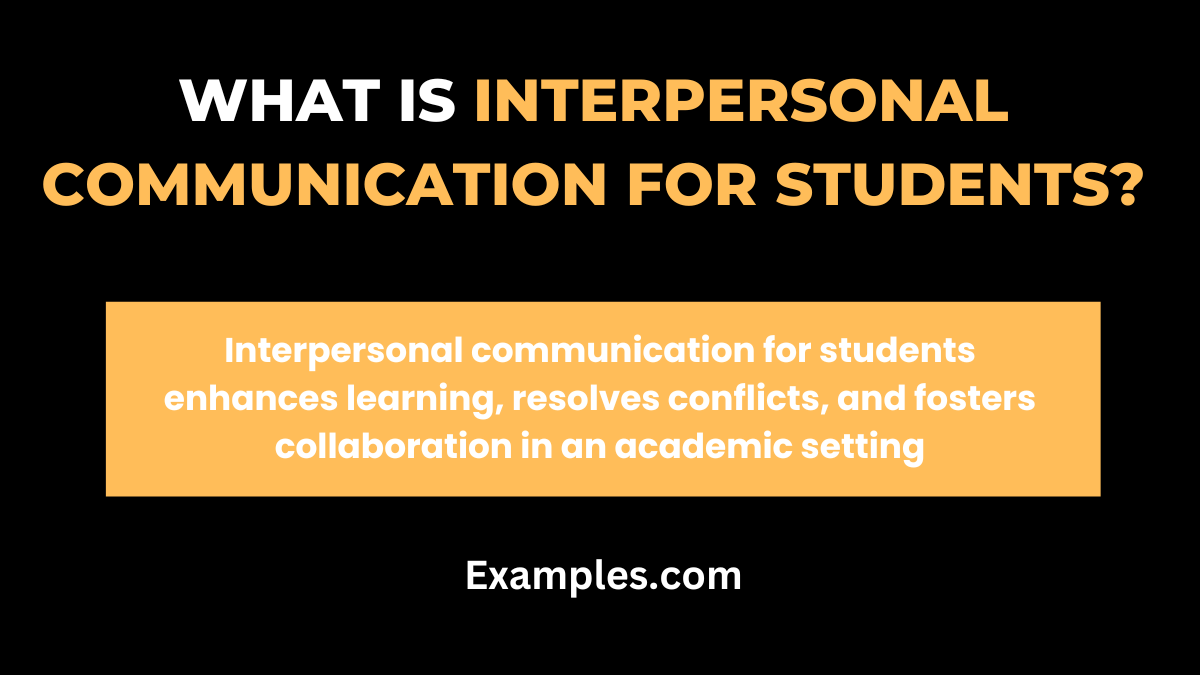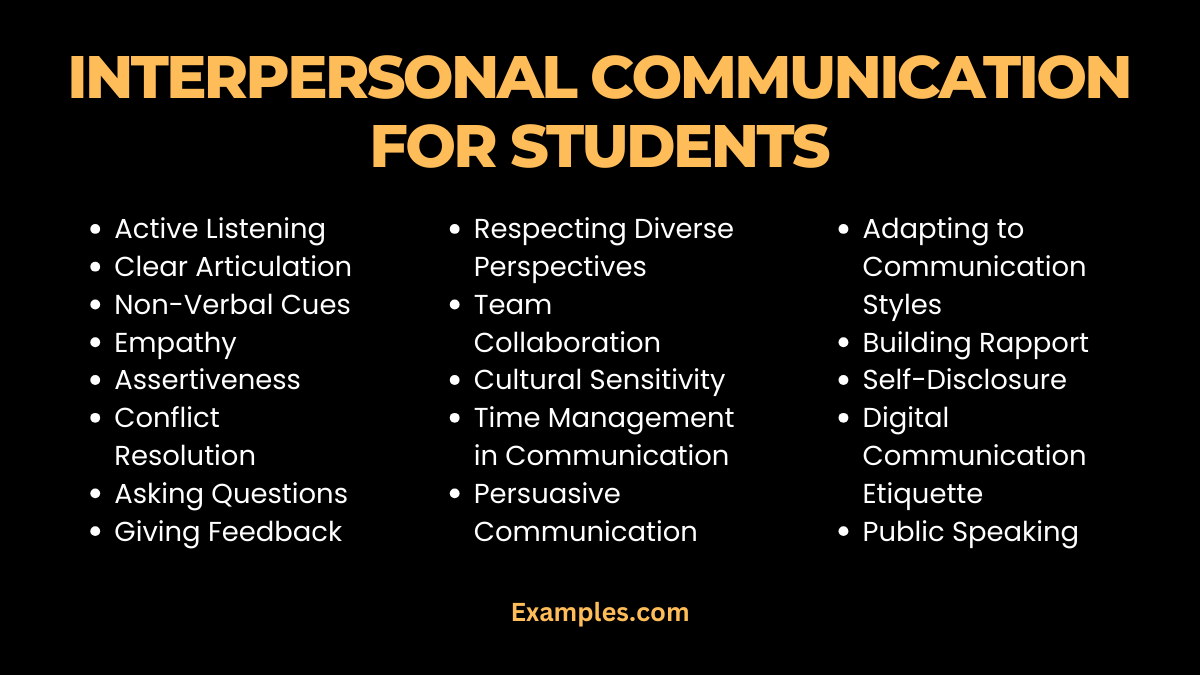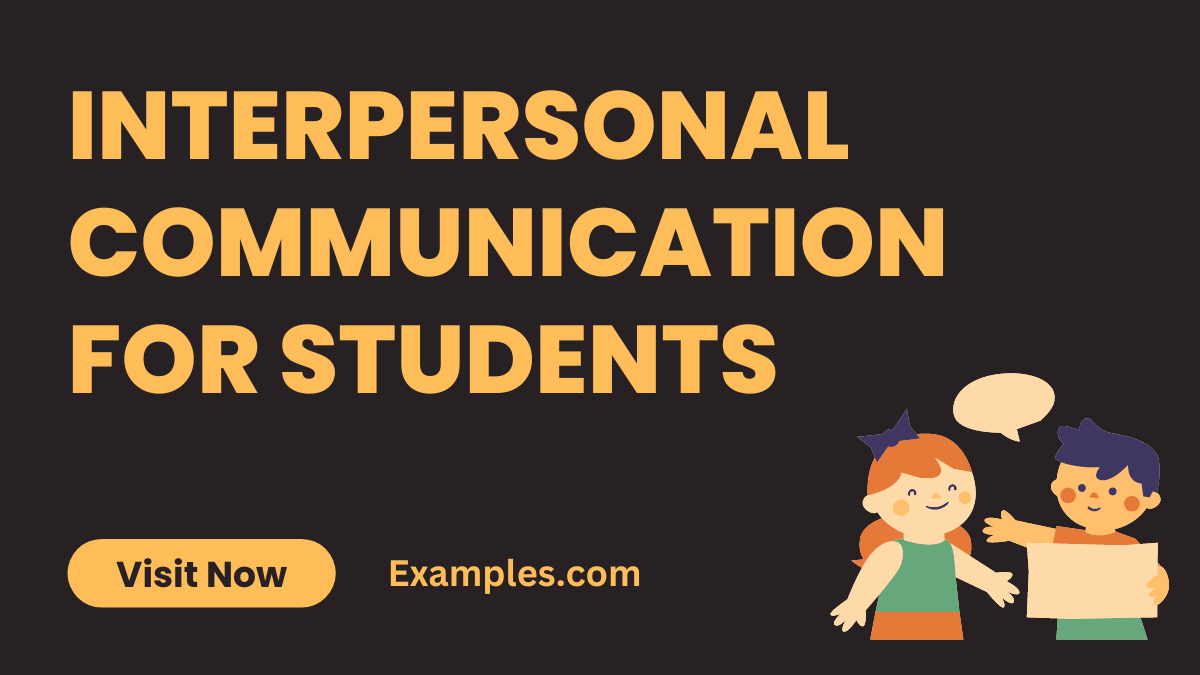19+ Interpersonal Communication for Students Examples
Embark on mastering interpersonal communication with this complete guide, designed specifically for students. This resource is filled with practical communication examples and tips tailored to the unique challenges and opportunities faced in academic settings. From enhancing group project dynamics to building strong relationships with peers and educators, this guide covers all aspects of interpersonal communication vital for student success. Whether it’s navigating classroom discussions, excelling in presentations, or fostering meaningful connections on campus, these insights are invaluable for students at all levels.
What is Interpersonal Communication for students?

Interpersonal communication for students refers to the exchange of information, feelings, and meanings between individuals within an academic setting. It encompasses a range of skills, including verbal and non-verbal communication, listening, empathy, and assertiveness, tailored to the unique environment of schools and universities. Effective interpersonal communication is crucial for students, as it enhances learning experiences, aids in conflict resolution, and facilitates successful collaborations in group projects and extracurricular activities. It’s a fundamental aspect of student life, impacting both academic performance and personal growth.
20 Interpersonal Communication for Students

Mastering interpersonal communication is crucial for students, impacting their academic success and social interactions. This guide offers 20 key aspects of interpersonal communication, each accompanied by practical examples. From effective listening to assertive speaking, these tips are tailored to enhance students’ ability to communicate in diverse academic settings. By applying these skills, students can navigate group projects, classroom discussions, and campus life more effectively, building stronger relationships and achieving greater success in their academic journey.
- Active Listening: Pay full attention and show understanding in conversations.
Example: “I hear your point about the group project, and I understand your concerns.” - Clear Articulation: Speak clearly and concisely to convey your message.
Example: “In my opinion, this approach will streamline our project effectively.” - Non-Verbal Cues: Use body language and facial expressions to communicate.
Example: “I nod and maintain eye contact to show I’m engaged.” - Empathy: Show understanding and sensitivity to others’ feelings.
Example: “I can see why that comment upset you. It wasn’t considerate.” - Assertiveness: Express your thoughts confidently and respectfully.
Example: “I feel that my idea wasn’t fully considered. Can we revisit it?” - Conflict Resolution: Address disagreements constructively.
Example: “Let’s find a solution that works for all of us.” - Asking Questions: Encourage clarity and deeper understanding.
Example: “Can you elaborate on your point about the assignment?” - Giving Feedback: Offer constructive and helpful feedback.
Example: “Your presentation was great. Maybe try speaking a bit louder next time.” - Receiving Feedback: Accept and learn from feedback graciously.
Example: “Thank you for the feedback. I’ll work on those areas.” - Respecting Diverse Perspectives: Value and consider different viewpoints.
Example: “I appreciate your perspective. It brings a new angle to our discussion.” - Team Collaboration: Work effectively within group settings.
Example: “Let’s divide the tasks based on everyone’s strengths.”

- Cultural Sensitivity: Be aware of and respect cultural differences.
Example: “I’m curious about your traditions. Can you tell me more?” - Time Management in Communication: Respect others’ time during conversations.
Example: “I’ll be brief to respect your time.” - Adapting to Communication Styles: Tailor your communication to different people.
Example: “I noticed you prefer emails, so I’ll send my updates that way.” - Building Rapport: Establish a connection with classmates and teachers.
Example: “I start conversations by talking about common interests.” - Persuasive Communication: Influence others through logical and emotional appeal.
Example: “This approach benefits us because it’s efficient and aligns with our goals.” - Storytelling: Use narratives to make your communication engaging.
Example: “Let me tell you about a time when this method worked well for me.” - Self-Disclosure: Share personal experiences to build trust.
Example: “I faced a similar challenge last year. Here’s what I learned.” - Digital Communication Etiquette: Communicate effectively online.
Example: “I keep my emails polite and to the point.” - Public Speaking: Deliver presentations confidently and clearly.
Example: “I practice my speech to ensure clarity and confidence.”

What are the elements of Interpersonal Communication for Students
- Verbal Communication: The use of words to convey messages, crucial for classroom discussions and presentations.
- Non-Verbal Communication: Body language, gestures, and facial expressions that supplement verbal communication.
- Listening: An essential skill for understanding lectures, instructions, and peer viewpoints.
- Feedback: Both giving and receiving feedback are important for academic growth and development.
- Empathy: Understanding and relating to the emotions of classmates and teachers.
- Assertiveness: Expressing oneself clearly and confidently without being aggressive.
- Questioning: Asking questions to gain clarity and encourage deeper thinking.
- Conflict Resolution: Skills to manage and resolve disagreements constructively.
- Cultural Awareness: Being aware of and sensitive to cultural differences in a diverse academic environment.
- Rapport Building: Developing positive relationships with peers and educators for a supportive learning environment.
Interpersonal communication activities for college students
- Group Discussions: Encouraging open exchange of ideas on various topics.
- Role-Playing: Simulating real-life scenarios to practice communication skills.
- Debate Sessions: Engaging in structured arguments to develop persuasive skills.
- Peer Feedback Activities: Exchanging constructive feedback on academic work.
- Listening Exercises: Activities to enhance active listening abilities.
- Storytelling Workshops: Sharing personal stories to improve narrative skills.
- Cultural Exchange Programs: Promoting understanding of different cultures through interaction.
- Public Speaking Clubs: Providing a platform to practice and improve public speaking.
- Conflict Resolution Workshops: Teaching strategies to handle interpersonal conflicts.
- Empathy Circles: Activities focused on developing empathy and understanding.
Why is it Important to Study Interpersonal Communication for Students?
- Enhances Collaboration Skills: Understanding interpersonal communication is crucial for students to effectively collaborate in group projects and team activities. It fosters a cooperative environment conducive to shared learning and problem-solving.
- Improves Conflict Resolution: Knowledge of interpersonal communication equips students with the tools to resolve conflicts amicably, an essential skill in both academic and personal life.
- Boosts Self-Confidence: Proficiency in communication increases students’ self-confidence, especially in situations like presentations, debates, and class participation.
- Facilitates Effective Learning: Effective communication between students and teachers is key to enhancing the learning experience, ensuring that concepts are understood and queries are addressed.
- Aids in Social Development: For students, developing interpersonal skills is vital for social interaction, helping them build and maintain friendships and networks.
- Enhances Emotional Intelligence: Studying interpersonal communication helps in developing emotional intelligence, enabling students to understand and manage their emotions and empathize with others.
- Prepares for Future Careers: Strong communication skills are highly valued in the workplace. Learning these skills early prepares students for future professional interactions and opportunities.
- Improves Listening Skills: It’s not just about speaking; effective interpersonal communication also involves active listening, an essential skill for understanding and responding to others.
- Encourages Cultural Sensitivity: Students learn to communicate across diverse cultures, promoting inclusivity and respect in an increasingly globalized world.
- Strengthens Personal Relationships: Beyond the classroom, interpersonal communication skills are fundamental in nurturing and maintaining healthy personal relationships.
In conclusion, the study of interpersonal communication for students is not just an academic exercise but a vital skill set for personal development and future success. This comprehensive guide offers valuable insights and practical tips, emphasizing the importance of effective communication in academic, professional, and personal spheres. Students equipped with these skills are better prepared to navigate the complexities of social interactions, collaborate effectively, and build lasting relationships.



